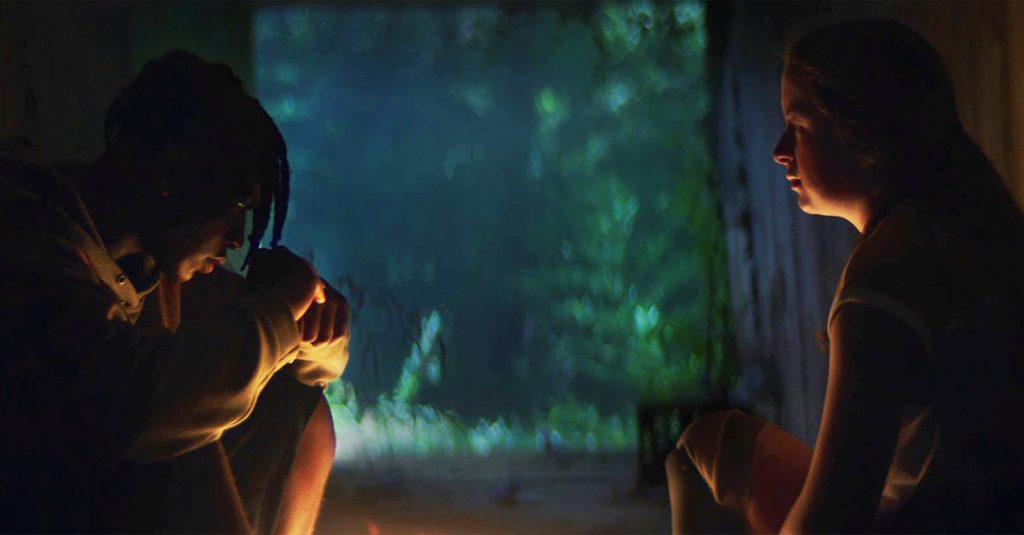
A strange, portentous story presses at the edges of reality in Spaghetti Junction (2023). We get minutely-realised everyday life, together with unusual elements of sci-fi and fantasy, but none of this follows expected patterns. Seething, indignant worry opens the film: we see a father’s anguish, as he rushes back to the family home to discover his youngest daughter, August, is missing. The film establishes early that all of this human drama is taking place on the outskirts of vast networks of roads and routes out of there: the ‘spaghetti junction’ of the title looms over the central characters, both restricting them and tantalising an escape. It’s something that August comes to consider, and it’s why she is gone.
All of this comes further down the line. Sisters Shiny (Eleanore Miechkowski) and August (Cate Hughes) are each on the cusp of adulthood, supported by a loving, if flawed dad, who isn’t quite abreast of what’s happening in their lives. They still act out dance moves together in the park; August has decorated her shoes with childish scribbles; the biggest difference between them now, though, is that Shiny has a boyfriend, Antonio (Jesse Gallegos), who is delightfully boorish with his crass car and bad neck tattoos. Little wonder that Shiny keeps the time they’re spending together on the downlow. August is left to lie for her to their father, or else taken along on dates like sibling baggage; along for the trip or not, she’s being left behind by her sister, and it hurts.
This is all compounded by a recent trauma. August has recently lost a foot in a road accident, and is only just learning how to live with the new normal, walking with a crutch and quite literally stumbling when she tries to keep up. The fact that she falls hard, early, when she tries to join in with Shiny’s little dance routine is clearly symbolic. But perhaps most of all, August is becoming morose, introspective. The shock of what has happened to her is only just beginning to land, with shock compounding regular teenage awkwardness at an already difficult point in her life. August spends a lot of time in bed – it’s easier that way – and sleep, or more properly, dreaming – is becoming her chief release.
She soon begins to find some kind of purpose in an increasingly strange blend of waking and dreaming worlds, feeling a ‘call’ from somewhere in the nearby woods, which corresponds to something she thinks she sees during a quick rest-break during one of Shiny’s godawful dates; someone’s sleeping rough out there, she discovers, someone she soon comes to realise needs her help. This progresses and takes on more and more significance, as her help is in fact gratefully received by this mysterious stranger, which all means a sizeable shift in genre and tone, as August finds herself on a kind of odyssey.
There’s a feeling throughout Spaghetti Junction of something momentous, even unpleasant or threatening, simmering away; the genuinely oppressive heat haze which hangs over the film finds echo in its early atmosphere more generally. It feels like, in every normal exchange, a revelation or an awful truth is lurking, and big decisions and changes threaten to come into view, long before anything actually happens. Much of this stems from August’s struggles, but Shiny feels displaced by trauma, too, and through all of this their father – a lone parent – can only do his best to keep up with two girls, each displaying their grief differently. Great attention to detail, without making use of a particularly extensive script, fleshes out a plausible and likeable set of flawed characters here. All the performances are natural and engaging, with special mention for Hughes as August, whose personal journey – however much of it is or isn’t grounded in real events – feels very real, and poignant. Cate Hughes is genuinely an amputee, and a first time actor, which is extraordinary. Things edge towards magical realism, but never by following expected trammels; this remains a grounded, urban story, with its cars, roads and beyond that, routes, junctions and journeys serving as symbols for August’s own progress towards something significant. Framing all of this, the scale and scope of the film is very diverse, zipping between intimate details and a big, wide, intimidating world out there, peopled – perhaps – by mysterious, possibly dangerous individuals.
Throughout, the fantastical and the everyday are kept in an unusual, engaging balance, as much as the plot edges towards the bizarre. You can be the judge of whether or not this film is allegorical; the point is its humanity, as it hones in on the idea of belonging. August and her ‘traveller’ develop an engaging relationship and their dialogue has some charming touches of humour, too, which works well. August, at the heart of it all, absolutely blossoms as the narrative unfolds. It’s impossible not to want that for her. This is a coming of age drama which weaves together elements of tried-and-tested genres, but comes up with something which feels very innovative, deeply compassionate and intriguing.
Spaghetti Junction (2023) recently screened as part of the Boston Underground Film Festival.
